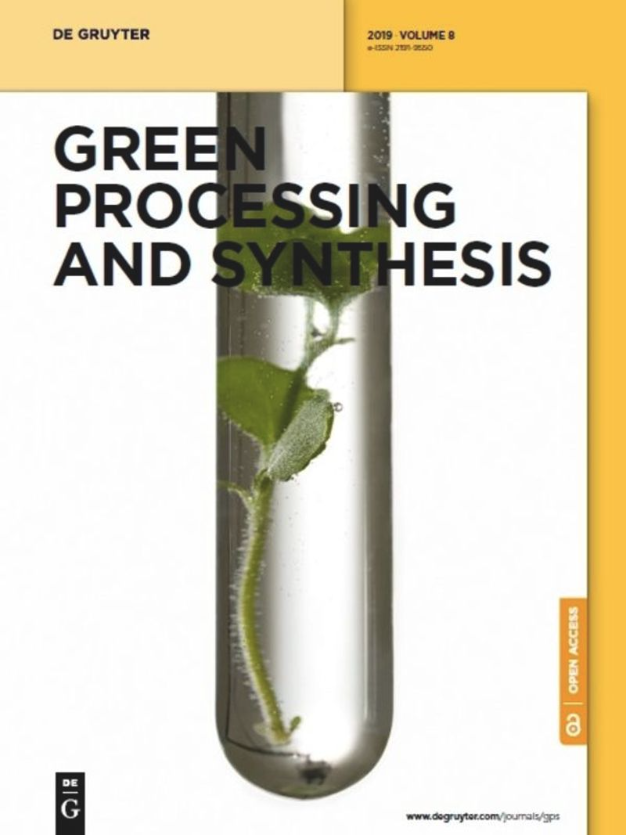在无溶剂和过渡金属的条件下,通过t- buna介导2-氨基苯酰胺和苯甲醇的氧化缩合,高效、绿色地合成2-苯基喹唑啉-4(3H)- 1
IF 3
4区 工程技术
Q2 CHEMISTRY, MULTIDISCIPLINARY
引用次数: 0
摘要
摘要喹唑啉酮的合成通常需要使用敏感的底物、危险的溶剂、大量过量的氧化剂和昂贵的催化剂。在本研究中,开发了一种有效且环保的途径,通过市售和稳定的化学品(包括2-氨基苯甲酰胺和苯甲醇)之间的氧化偶联合成2-苯基喹唑啉-4(3H)-酮,而无需有毒氧化剂和过渡金属催化剂。在120°C下24小时内获得所需产物的高产率(高达84%) h,在作为绿色氧化剂的氧和作为碱的t-BuONa的存在下。重要的是,研究范围扩大到以中等至良好的产率成功生产各种2-苯基喹唑啉-4(3H)-酮衍生物。此外,对照实验表明,转化包括在碱性条件下苯甲醇初始部分氧化为苯甲醛中间体,然后缩合、分子内亲核加成和氧化脱氢为2-苯基喹唑啉-4(3H)-酮。本文章由计算机程序翻译,如有差异,请以英文原文为准。
An efficient and green synthesis of 2-phenylquinazolin-4(3H)-ones via t-BuONa-mediated oxidative condensation of 2-aminobenzamides and benzyl alcohols under solvent- and transition metal-free conditions
Abstract Quinazolinone synthesis usually requires employing sensitive substrates, hazardous solvents, large excess oxidants, and expensive catalysts. In this study, an efficient and environmentally benign pathway was developed to synthesize 2-phenylquinazolin-4(3H)-one via oxidative coupling between commercially available and stable chemicals, including 2-aminobenzamide and benzyl alcohol without toxic oxidizing agents and transition-metal catalysts. A high yield of the desired product (up to 84%) was obtained at 120°C for 24 h in the presence of oxygen as a green oxidant and t-BuONa as a base. Importantly, the study scope was expanded toward successfully producing various 2-phenylquinazolin-4(3H)-one derivatives in moderate-to-good yields. Furthermore, control experiments proposed that the conversion involved the initial partial oxidation of benzyl alcohol to the benzaldehyde intermediate under basic conditions, followed by the condensation, intramolecular nucleophilic addition, and oxidative dehydrogenation to 2-phenylquinazolin-4(3H)-one.
求助全文
通过发布文献求助,成功后即可免费获取论文全文。
去求助
来源期刊

Green Processing and Synthesis
CHEMISTRY, MULTIDISCIPLINARY-ENGINEERING, CHEMICAL
CiteScore
6.70
自引率
9.30%
发文量
78
审稿时长
7 weeks
期刊介绍:
Green Processing and Synthesis is a bimonthly, peer-reviewed journal that provides up-to-date research both on fundamental as well as applied aspects of innovative green process development and chemical synthesis, giving an appropriate share to industrial views. The contributions are cutting edge, high-impact, authoritative, and provide both pros and cons of potential technologies. Green Processing and Synthesis provides a platform for scientists and engineers, especially chemists and chemical engineers, but is also open for interdisciplinary research from other areas such as physics, materials science, or catalysis.
 求助内容:
求助内容: 应助结果提醒方式:
应助结果提醒方式:


